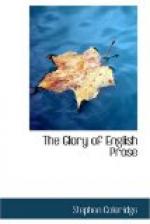This is nobly to use noble gifts; it is difficult to think ill of a man who can carry oratory for a glorious object to such heights of splendour. It may seem a duty to some to darken his character with detraction, but his inspiring words remain supreme and unsullied and will still live when such faults as may be truly laid to his charge are long forgotten. To fight for a great cause, Antony, is rightly to use great powers, and this is what Lord Brougham did with all his might.
Your loving old
G.P.
21
MY DEAR ANTONY,
In the great emprise of war it must often happen that the most awful scenes of manifested human power, and the most godlike deeds of human glory, are lost to the contemporary world, and utterly unknown to succeeding generations, because they were witnessed by no man with the gift of expression who could record for after time, in adequate language, the majestic spectacle.
In the great war against Germany no great writer has yet appeared who was personally in touch as a living witness of the countless deeds of glorious valour and acts of heroic endurance that were everywhere displayed upon that immense far-stretched front.
But in the wars of former times, a whole battle could be witnessed from its beginning to its end by a single commander, and no scenes in human life could be more terrible and soul-stirring than the awful ebb and flow of a great combat in which the victory of armies and the fate of nations hung in the balance.
The battle of Albuera in the Peninsular War might easily at this date have long been forgotten had not the pen of Sir William Napier been as puissant as his sword. The battle had raged for hours, and the British were well-nigh overwhelmed; the Colonel, twenty officers, and over four hundred men out of five hundred and seventy had fallen in the 57th alone; not a third were left standing in the other regiments that had been closely engaged throughout the day. Then Cole was ordered up with his fourth division as a last hope, and this is how Sir William Napier records their advance:—
“Such a gallant line, issuing from the midst of the smoke and rapidly separating itself from the confused and broken multitude, startled the enemy’s masses, then augmenting and pressing onwards as to an assured victory; they wavered, hesitated, and vomiting forth a storm of fire hastily endeavoured to enlarge their front, while a fearful discharge of grape from all their artillery whistled through the British ranks ... the English battalions, struck by the iron tempest, reeled and staggered like sinking ships; but suddenly and sternly recovering, they closed on their terrible enemies, and then was seen with what a strength and




